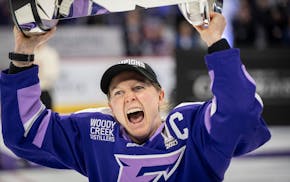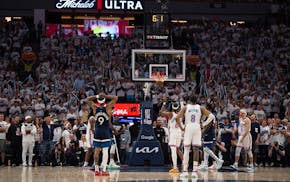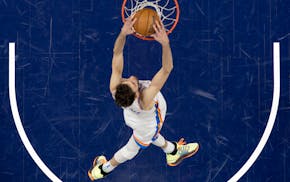LOS ANGELES – For Timberwolves coach Chris Finch, Tuesday's season-opening 110-103 loss to the Lakers felt like a repeat of the circumstances that led to a similar clunker in last season's opener against Toronto.
"It was my biggest fear from an offensive point of view," Finch said. "Exactly what we did last year."
Finch lauded the offense before the first regular-season game, only for it to resemble nothing like the style of play the Wolves showcased in practice and their handful of preseason games.
As a result, Finch's favorite go-to descriptor when the ball stops moving reared its head in his postgame remarks.
"Ball got super sticky," Finch said. "Then everybody went one-on-one."
Guard Anthony Edwards attributed the Wolves' loss to open looks not going in, but Finch saw a chicken-and-egg quality to the views of the game. Yes, the open looks didn't fall, but Finch said that by the time those looks arrived, the Wolves had already spent too much time — the first half of the game — trying to find a groove.
"Really disconnected. Like all the flow, rhythm, goodwill that we built up offensively through the preseason, we just didn't have it," Finch said. "Then when we were able to have some open looks, they didn't go in for the large part there. We didn't generate enough good ones for us to be able to catch any rhythm."
The Wolves shot 41% overall, 32% from three-point range. If there's a difference between last season's opener and this one, it's that this season's team is still developing chemistry because Julius Randle and Donte DiVincenzo joined during preseason after a trade with the Knicks.
There were times on both ends of the floor the Wolves looked like a group that hadn't played much together while the Lakers, behind 36 points from Anthony Davis, looked like the more comfortable team. The Wolves had moments of strong defense, but in the second quarter, the lane became a layup line with Rudy Gobert out, and the Lakers built their lead. They also crashed the glass on the Wolves for 19 second-chance points.
"They were the team that got most of the 50-50 balls. That can't happen," said Gobert, who has agreed to a new contract, a source confirmed before the game. "It has to be who we are every night. That's our identity. That's one of the reasons we were so good last year. We were the most hungry team almost every night. We gotta find that."
Last season, the Wolves had continuity with the roster that set in after the first few games. This season could be a work in progress. There appeared to be plenty of communication lapses on defense.
"There was a lot going on in the game plan tonight. Maybe too much at times," Finch said. "We might have to simplify some things early here. But I didn't see a lot of resistance like we would normally. Even when we had opportunities to contain, we didn't do a good job of that early on."
On offense, the Wolves were slow to act at times. That led to 11 first-half turnovers.
"We were just stagnant. We were all out there playing hard, trying to do a little too much," Randle said. "Myself, I had two that were one I could've avoided."
In addition to those two turnovers, Randle had 16 points and nine rebounds. The other new member of the Wolves, DiVincenzo, had 10 points on 3-for-11 shooting. Mike Conley, the straw who usually stirs the ball movement, had an uncharacteristic off night, with five points on 1-for-7 shooting to go with three turnovers. He was a team-low minus-22.
Edwards, who had 27 points on 25 shots, wasn't worried about any of it. To him, Tuesday was no big deal. The Wolves just missed some shots; that's just the way it goes.
But he did add: "We wasn't ready to play. … We came out too relaxed, like people respect us. We got to bring more. Sacramento, we'll be better."
Finch would agree on that point.
"We got to find another level of urgency right now," Finch said. "Season's started, and we didn't answer the bell."

PWHL expansion to Seattle and Vancouver could shake up Frost's championship team

RandBall: 10 things to know about Minnesota sports today

Meet the best high school freshman athletes in Minnesota
![Anthony Edwards, Julius Randle and the Wolves were always a step behind the Thunder on Monday.
] CARLOS GONZALEZ • carlos.gonzalez@startribun](https://arc.stimg.co/startribunemedia/CJVGEXG7INGRNHAEH5TAVZQ24U.jpg?h=91&w=145&fit=crop&bg=999&crop=faces)
Podcast: Patrick Reusse on why he never thought the Wolves would win Game 4

